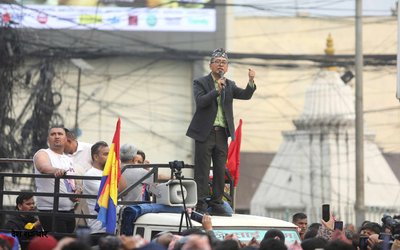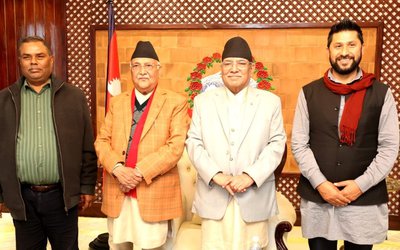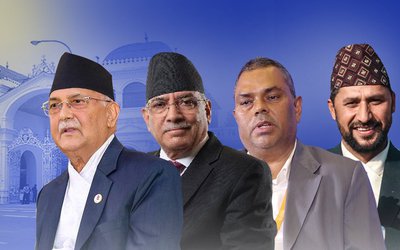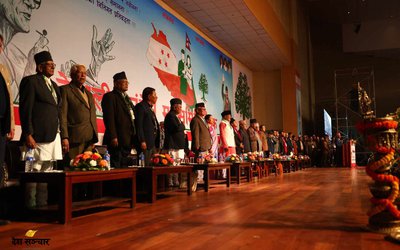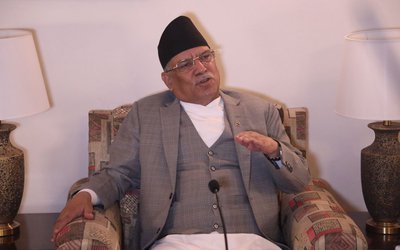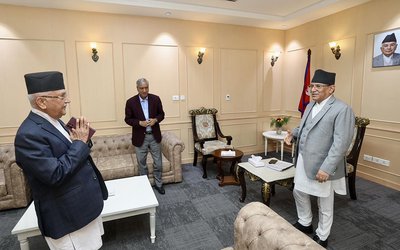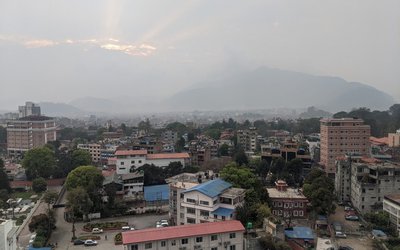As the deadline for the promulgation of a new constitution slowly draws near, the three major parties in the Constituent Assembly are stuck in internal wrangling and intra-party fighting thanks to the bitter rivalry and factionalism among the top leaders.
It has hit the main opposition Communist Party of Nepal Maoist (CPNM) hardest. Having been shocked to the third position in the constituent assembly elections the top leaders have not been able to reconcile to the secondary role they have been reduced to.
Instead of getting united in the difficult times of the party, they have been engaged in efforts at safeguarding and consolidating their respective positions at the cost of each other. The most vocal has been the senior leader and former prime minister Baburam Bhattarai who is miffed that chairman Pushpa Kamal Dahal has not owned up the responsibility for the party's thrashing in the polls. Bhattarai has even floated the idea of a third force which Dahal sees as the former's bargaining chip for a better role and position.
There has been intense speculation that the rift between the two could even lead to a virtual split. Bhattarai, in particular, has hinted that he would be ready to lead a new party that would include the "like-minded" people from other parties as well. Threatened with a Bhattarai revolt, Dahal has sent olive branch to the erstwhile comrade Mohan Baidya who split from him less two years ago. For the first time after the split in the party, the two even issued a joint statement to warn against the proposed local elections and the possible moves to try those "guilty" of war-crimes during the 10-year-old insurgency.
The party that replaced the CPNM as the largest party, the Nepali Congress, has been plagued with an internal wrangling of a different kind. The ‘Grand Old Party’ saw the intra party conflict raising an ugly head soon after its victory in the election. The conflict between the NC trio Prime Minister Sushil Koirala and party Vice President Ram Chandra Poudel and senior leader Sher Bahadur Deuba began with the tussle of leadership. Although differences were sorted out after party president Koirala was voted to lead the government, power sharing among Poudel and Deuba has now become a contentious issue.
Poudel claims that he was assured the post of acting President in return for the support to Koirala for the prime minister's chair. Going by the party statute, he maintains that only a vice president has the right to become acting president. He, however, complains that Koirala has not kept his word. A miffed Poudel’s recent antics show that he is not ready to cooperate with the party anymore. He recently cancelled an event to commemorate late party leader Girija Prasad Koirala to show his displeasure. Upset at the party for not giving him his due, Poudel has even started reaching out to central committee members asking them to lobby for him.
One the other hand, growing dissatisfaction of Poudel’s arch rival Deuba has been a rising concern for the party. Deuba has claimed time and again that he supported Koirala’s prime ministerial bid in exchange for more authority and the role in the party. Rejecting the argument that the party statute allows only the vice president to be promoted to the post of acting president, he has asked for the amendment of party statute according to the need of time.
The second largest party in the CA, CPN UML does not fare any better. It all started with the row over the control of Home Ministry which has since been resolved, but not before it created deep mistrust and misunderstanding among the UML leaders. On one side stood the eventual home minister and deputy prime minister Bamdev Gautam and the senior leader K.P. Oli while former prime ministers, Madhav Kumar Nepal and Jhalanath Khanal represented the rival camp. Both UML Chairman Jhalanath Khanal and Nepal were not willing to see Gautam as the home minister due to his crucial role in defeating Khanal in elections for the post of parliamentary party (PP) leader against the eventual winner Oli. The bitter friction between the leaders has now reached a climax.
If not resolved before it is too late the bitter infighting and conflict within the top three parties could not only delay the constitution making process , but derail the whole process as well. It will also have adverse impact on the local elections which was initially due to be held within six months of the CA elections.
- Ukrainian Crisis And The World (Dis)Order
- Apr 22, 2022
- China’s Cautious Steps In The Graveyard Of Empires
- Aug 18, 2021
- Foreign Aid On The Fence!
- Aug 08, 2021
- Communist Party of China centenary celebrations Reading between the lips
- Jul 14, 2021
- Second Wave Of Covid-19 In India: Deadly Blow To The Economy
- Jun 23, 2021


